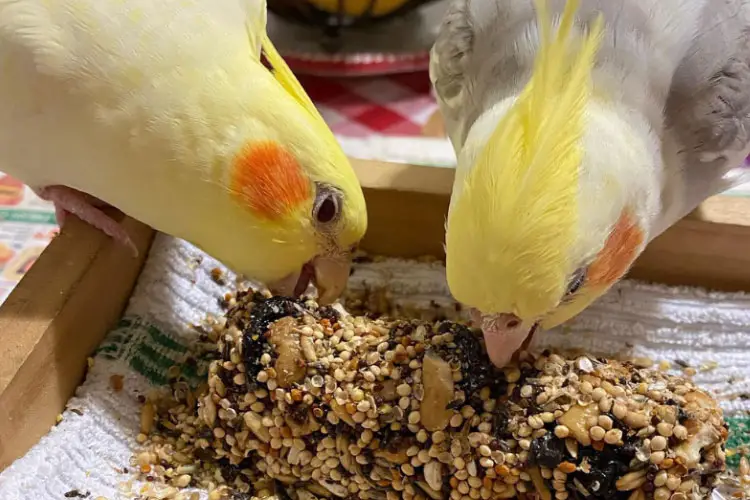All bird lovers want to see their pet birds doing healthy activities. Regurgitating and vomiting are some of the complicated activities for owners to differentiate in pet birds like cockatiels. Luckily there are ways to tell one from the other.
So, is my cockatiel vomiting or regurgitating? While both may look the same, vomiting is involuntary, and the bird may show signs of nausea or diarrhea. When regurgitating, the cockatiel is more relaxed and often does it on its favorite toys or cage mates to show affection.
Since both are distinguishable through careful observation, they have different causes, treatments, and prevention measures. Read on to learn more ways to differentiate the two and the steps to take.
Is My Cockatiel Vomiting or Regurgitating?
After feeding, it’s normal to expect the food to come out of your bird through excretion. However, this is not always the case, as they sometimes expel food contents through their mouths. While this is normal, it can also signify a health issue.
Regurgitation is the voluntary expulsion of food contents from the esophagus or the bird’s crop. The bird will often regurgitate in other birds’ mouths or its chicks. Also, cockatiels can disgorge on their toys, perch, or owners.
Vomiting, on the other hand, is an involuntary expulsion of stomach contents through the mouth. The action is a reflex, and the bird will seem to have no control over it.
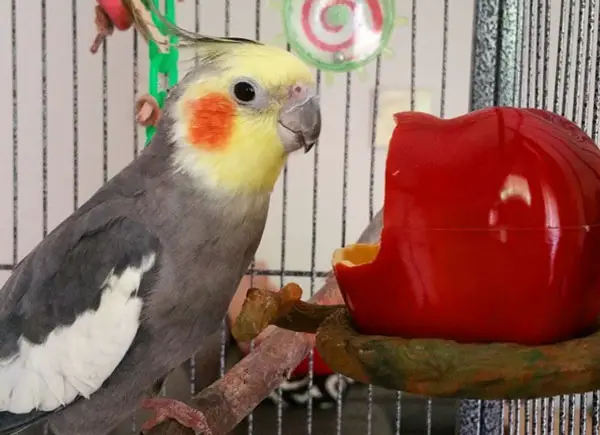
In contrast, vomiting is involuntary. The bird will vomit on various items or different people. And it’s often a sign of underlying medical condition.
To tell whether your cockatiel is regurgitating or vomiting, you need to observe its body language. If it looks relaxed and in charge of the expulsions, it’s likely regurgitating. However, if your cockatiel expels the stomach contents involuntarily and looks sick, it’s likely vomiting.
You can also observe other symptoms like appetite loss and lethargy, which are common if your bird is vomiting. Sometimes the eyes may also become watery, which is also a sign of sickness in your cockatiel. If you realize this, you should call your vet for diagnosis immediately.
What causes Cockatiels Vomit or Regurgitate?
Each of these expulsions has a reason since one is voluntary while the other is not. However, the exact reason is determined after a diagnosis done by an avian vet. Below are some causes of vomiting or regurgitating in cockatiels.
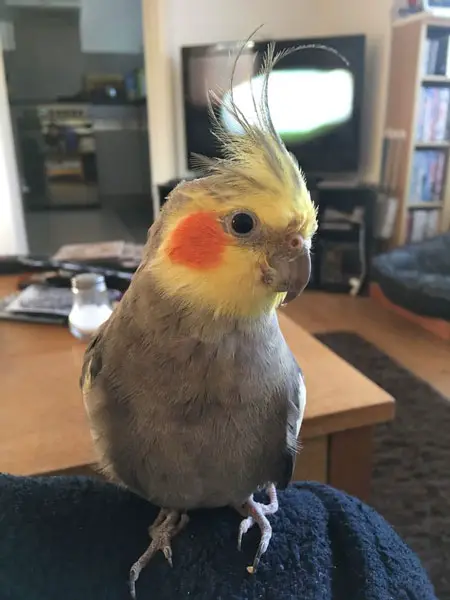
Regurgitating
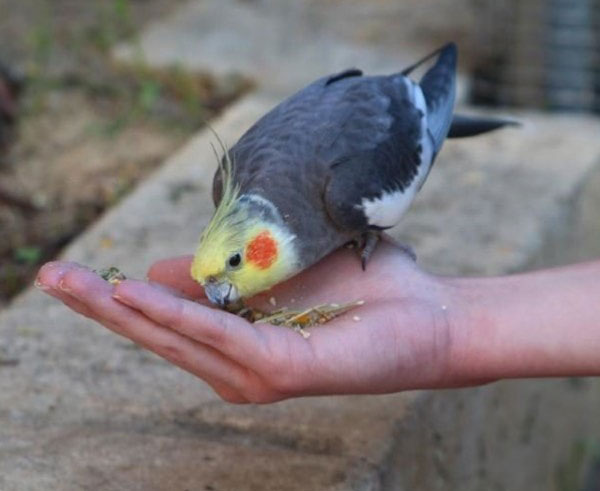
Here are 7 common signs that indicate your cockatiel is regurgitating.
- Stress – A bird under a new environment or pet stress is likely to regurgitate more. You should expect the behavior to fade as the bird continues getting used to the new environment.
- Overfeeding – Baby cockatiels feeding on formula will regurgitate if they’re overfed or the formula is inconsistent. To prevent this from happening, you should only feed them enough, especially at that tender age when they don’t know much.
- Overplaying – Since cockatiels are playful and active birds, they sometimes overplay and regurgitate food that is still in their crop. Sadly, there is little you can do to prevent this from happening, although it’s a rare occurrence.
- Excitement – Cockatiels that have bonded well often get excited when their owners walk in the room. They sometimes regurgitate if they’re too excited while feeding.
- Show Affection – Cockatiels who regurgitate on their owners sometimes do it to show affection, but sometimes a mating interest. You should be careful to differentiate between the two so that you can fulfill their desires accordingly.
- Nesting Behavior – While in season, cockatiels will regurgitate on their partners to show affection and interest.
- Feeding hatchlings – Parent cockatiels feed their hatchlings by regurgitating food in their mouth. This goes through until they have aged enough to feed by themselves.
You can always tell when your cockatiels are regurgitating because they accompany it with notable behavior. Rarely should this be a concern unless they overdo it, and they will be expressing themselves.
Vomiting
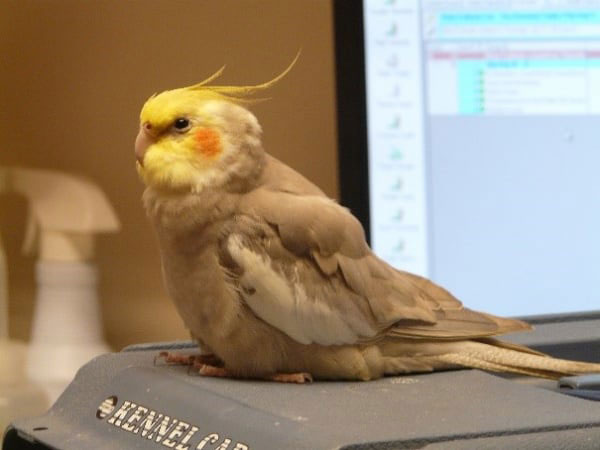
Check out the 5 common signs to ascertain whether your cockatiel is vomiting.
- Bacteria – Bacteria can cause your bird to vomit food in their stomach. Most bacteria in food are from spoilt food or water that have stayed out for a long time. Salmonella bacteria is a dangerous one that can get transferred to your bird from leftover food. It can cause diarrhea and make your cockatiel vomit.
- Parasites – The presence of parasites in the bird’s intestines can cause infections that are symptomized by vomiting. Giardiasis is a diarrheal disease caused by a giardia parasite that affects birds resulting in symptoms like vomiting. Hexamita parasites can also cause diarrhea symptoms in birds.
- Toxins – Ingested toxins can also affect your bird’s health and cause them to vomit. Toxins can be from plants like mistletoes or toys with lead or zinc.
- Airways obstructions – Like humans, if your pet cockatiel chokes or has a throat obstruction, it can force your pet to vomit. Choking is also accompanied by coughing and struggling to breathe, and your pet bird can die.
- Yeast infection – Candida albicans are among the common environmental fungus that infects birds. These infections can cause the bird to vomit because they infect the digestive tract and the bird’s crop
It is never okay for your cockatiel to vomit. Unlike when regurgitating, vomiting means your bird loses a lot of fluid, which may trigger dehydration. After contacting a reliable avian vet, the next thing should be done is to provide your cockatiels with clean water. If you can get an electrolyte solution, the better because it helps the birds hydrate faster.
How Do I Differentiate Vomiting and Regurgitating in Cockatiels?
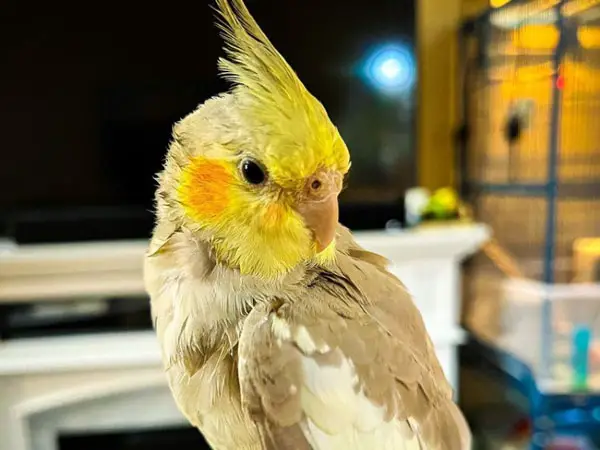
It’s often a mystifying task to differentiate between vomiting and regurgitating, especially for new cockatiel owners. However, despite their resemblance, there are possible ways to tell. The table below contains the various ways to tell vomiting from regurgitating in a cockatiel.
| Regurgitating | Vomiting |
| The birds seem in control | The expulsion is involuntary |
| On specific objects, especially favorites | Anywhere in the cage and on any object |
| In other birds’ mouth | Anywhere in the cage |
| The bird may look worried or stressed | Bird looks sick |
| The bird is healthy and playful | The bird exhibits other signs of illnesses |
| Bird breathing rhythms are not much affected | The bird may appear chocked or breathing heavily |
How Do You Treat a Vomiting or A Regurgitating Cockatiel?
Since some causes of regurgitation don’t require medical attention, their solutions are at home. If your cockatiel is stressed or fearful, various adjustments to reduce stress can be done in their environment to make them comfortable. However, if your bird is diagnosed and found to be vomiting, the avian veterinarian will prescribe the treatments.
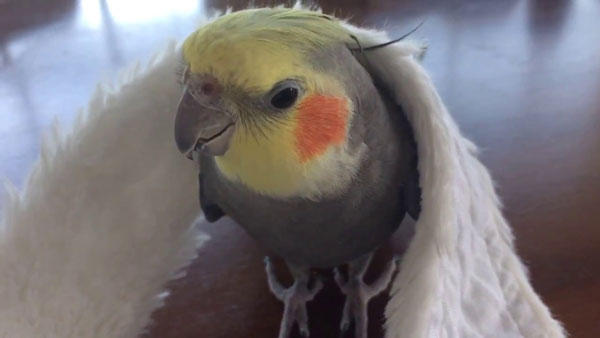
Most times, if the cause is bacterial-related, the bird will get some antibiotics. If the cause is determined to be parasite-related, your vet will administer various oral and injectable medications. Toxins are diagnosed by x-ray, especially those of lead and zinc intoxication, and treated by chelation therapy. This one has no shortcut; you will need a vet for diagnosis and prescription.
What Are the Precautions Against Vomiting and Regurgitating?
Some treatments for vomiting and regurgitating are both money and time expensive. Therefore, taking precautions based on past experiences is always best to keep your pet bird healthy. Following are some precautions to keep your cockatiel from vomiting and regurgitating.
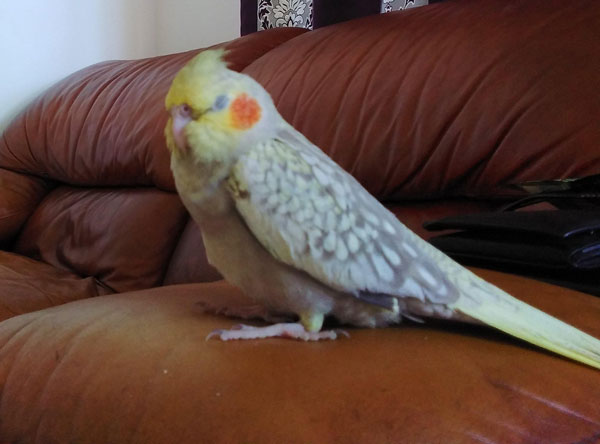
- Take time to introduce yourself and other pets to your new bird to avoid causing fear or stress.
- If your bird regurgitates on you, put it back in its cage to discourage the behavior.
- Avoid stale food or contaminated water to protect against food-related bacteria.
- Don’t provide toys or items with harmful metals like zinc and lead
- Keep away plants that are harmful to your pet’s health.
- Take your pet to a vet regularly to get checked.
FAQ
As a bird lover you probably have some lingering questions you feel we have not covered. Read below to find some questions and answers related to this topic.
It is not normal for cockatiels to vomit since it’s involuntary and symptomizes possible health problems. However, regurgitating is normal since birds have control over it, and most times doesn’t signify a serious health problem. Observe your pet keenly to know if it’s regurgitating or vomiting.
Since vomiting signifies a possible health problem, it’s best to notify your avian vet. The vet can diagnose and learn the cause of the vomits before deciding how to treat it. Possible treatments include oral and injections medications and antibiotics.
Vomiting is involuntary and can signify either bacterial or parasite infections in your cockatiel. Regurgitating is often voluntary and might even signify that the bird is excited or affectionate. Vomiting and regurgitating are similar in the sense that they’re both expulsions but different in reasons and causes.
Outro
Regurgitating and vomiting are some of the confusing cockatiel activities. While both are visually similar, they have different reasons. Observing their body language and other symptoms can help you distinguish one from the other.
Birds, including cockatiels, can control regurgitating, especially if it’s a sign of affection or as a breeding behavior. Vomiting on the other hand is involuntary and sometimes accompanied by other diarrhea symptoms. However, if you can’t decipher it, contact your avian vet and explain the symptoms.
